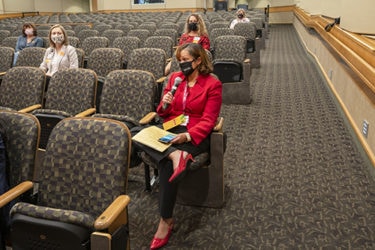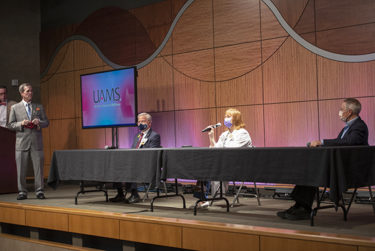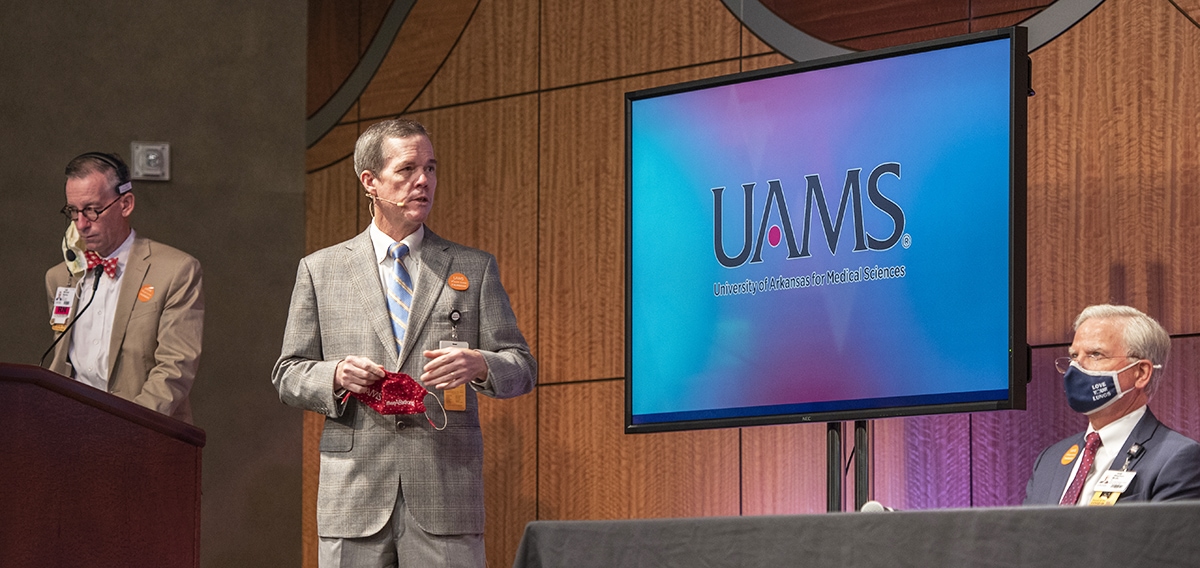Chancellor’s Town Hall COVID-19 Panel Answers Questions about Third Shots, Immunity
| As soon as Sept. 20, UAMS may begin offering third vaccination shots to further protect its vaccinated students, employees, and members of the community against COVID-19.
That was one of the important messages driven home by a panel of expert UAMS physicians at a Chancellor’s Town Hall meeting Aug. 19. Third doses currently are only available to vaccinated, immunocompromised patients.
Watch a video recording of the Chancellor’s Town Hall.
Clinicians have observed waning immune protection among vaccinated nursing home residents and the elderly. The majority of vaccinated, hospitalized COVID-19 patients are cancer survivors, people with autoimmune disorders and recipients of organ transplants.

Danielle Lombard-Sims answers a question at the Town Hall while seated and safely spaced in the Smith Auditorium. Several members of UAMS leadership were on hand at the meeting to answer questions.Image by Evan Lewis
“We have not seen otherwise healthy vaccinated people who are infected with COVID-19 being the primary cause of hospitalization,” said Michelle Krause, M.D., MPH, professor in the Division of Nephrology in the UAMS College of Medicine Department of Internal Medicine.
She added that the unvaccinated are the group who continue to drive hospitalizations.
Krause was one of three physicians on the panel that also included Steppe Mette, M.D., UAMS Medical Center CEO and senior vice chancellor of UAMS Health, and Robert Hopkins, M.D., professor and division director of General Internal Medicine and chair of the National Vaccine Advisory Committee to the U.S. Department of Health & Human Services. Along with members of university leadership present at the meeting, the panel answered questions submitted by members of the online audience.
UAMS is working to open an additional vaccine clinic for walk-ins and registered patients who meet the criteria for a third vaccination of booster shots. Regional Campuses and other UAMS clinics will offer them as well.
Hopkins said it’s very important this year for everyone also to get their influenza vaccinations. Both the flu and the new delta variant of the COVID-19 virus have the potential to do a lot of harm this fall and winter.

Michelle Krause, second from left, answers a question during the Town Hall meeting. Other members of the panel were Steppe Mette, left, Robert Hopkins, right.Image by Evan Lewis
The overall trends in the delta variant’s spread are not coming down, said UAMS College of Public Health Dean Mark Williams, Ph.D. Infections per capita were at 85 per 100,000 two days ago, and there has not been a decline.
“What is worrying us most is that schools are probably the most effective setting for spreading a virus like this,” Williams said. “Despite some schools requiring masks, there are times when children cannot be masked, like when they are in lunch rooms, and that is very dangerous.”
Those children in turn may then carry an infection home with them, where family members understandably aren’t wearing masks, Williams said.
“We expect to see another climb in the next few weeks in COVID infections in Arkansas, and we are not expecting any downturn, especially for hospitals,” he said.
Some members of the College of Public Health faculty have formed an expert team that has been doing predictive modeling of the pandemic since it began in early 2020, in part to help with health care planning.
Having had and recovered from COVID-19 in 2020 does not offer the kind of natural immunity people may need either.
“If you had a COVID infection in March or April, then you are likely protected against that strain that was circulating then, not the delta variant,” Hopkins said. “I would not rely on immunity through previous infection. Wait two or three weeks after quarantine, then get vaccinated. If you had been infected and get vaccinated, you are super protected. You are Superman.”
In response to a question about whether UAMS could again shut down key areas as it did in the spring of 2020, Chancellor Cam Patterson, M.D., MBA, said the university shut down then for reasons of capacity and staffing as well as to keep people safe.
“We didn’t have the mechanism in place to keep people safe who came in for non-COVID reasons. We’ve solved for that. If we shut down again, then it will be for capacity reasons,” Patterson said.
Even though things may be even worse now, UAMS is better prepared with plentiful supplies and new safety practices in place.
Mette said UAMS and the nation did not understand what it was facing at first, but “we’ve learned a lot since then.”
Prompted by a question about the use of ivermectin as an effective treatment for COVID-19 infection, Hopkins said, “No, no, and no. There is no evidence that ivermectin has any preventive or therapeutic benefit for COVID-19. The same applies to hydroxychloroquine, to vitamin D and the same applies to multiple vitamin and mineral cocktails.”
Patterson joined Hopkins in delivering warning about the use of the drug.
“I would add that there are more people getting ivermectin from tractor stores than from prescriptions and pharmacies,” he said. “That is an incredibly dangerous thing to do. It’s a dewormer for cattle.”
Earlier in the meeting, Krause presented information about an approved and effective therapy using monoclonal antibodies (MAB).
The Federal Drug Administration in November 2020 authorized the emergency use of MAB for mild to moderate COVID-19 disease in high-risk individuals. The therapy has helped to decrease hospitalizations, decreased length of stay if hospitalized, reduced emergency department visits within 30 days of infection and decreased the risk of death.
Early in its use at UAMS, the therapy was delivered through infusions. Many clinics aren’t equipped to give infusions, but the FDA recently approved administering the therapy through subcutaneous injections. That makes it possible for UAMS to expand MAB to its Regional Campuses and other clinics, Krause said, and it is doing just that.
“I think of these monoclonal therapies as a kind of vaccine in a can,” Patterson said. “It gives you the same benefit for a short duration of time that vaccines give you for a longer period of time.”
At the start of the meeting, Patterson played a short video of a parade of tow trucks and emergency vehicles that circled the UAMS Medical Center just after dark on Wednesday night with their emergency lights flashing. The Professional Towing and Recovery Association organized the event to honor “Health care Heroes” working at UAMS.
“UAMS is doing as well as it is only because of all of you who work here and dedicate yourselves to its missions,” Mette said. “It’s remarkable what and who we are. UAMS should be proud, and is proud of everyone who works here.”
